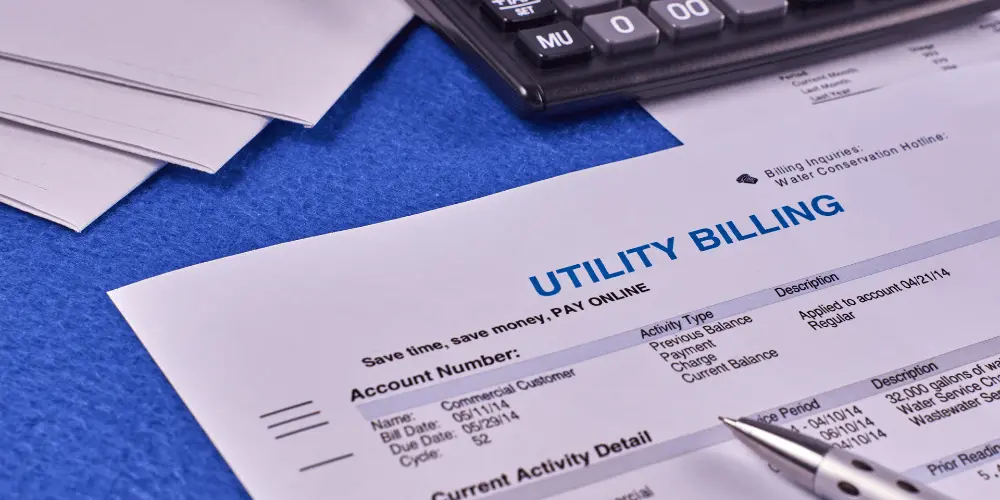
Missing utility payments may seem less urgent than skipping rent, but in many leases, they are treated the same. If your lease says that utilities are part of your rental obligations, non payment could be grounds for legal action. The details vary depending on your city, landlord, and property type. In some apartments, utilities are billed directly by the landlord and added to your rent. In others, the utility company collects payment, but failure to pay still violates the lease.
Every lease agreement spells out who is responsible for monthly utility bills. Some landlords include gas or water, while others expect tenants to cover everything. If your lease states that utilities are considered “additional rent,” then unpaid bills are treated like unpaid rent. That can trigger eviction.
See Credit.org’s guide on what to do if you’re behind on rent for more ways to stay current.
In some properties, landlords pay certain utilities, like water or trash, for all tenants. This cost is built into your monthly rent. In other cases, you may be billed separately for gas, electricity, or a water bill. Knowing which company is responsible helps you plan.
If your lease says unpaid utility bills are considered rent, your landlord can collect those charges just like missed rent. A pattern of non payment may lead to notices, fees, or eviction.
Utility shutoff and eviction are two different processes. A utility company can disconnect service after giving notice, but only a court can evict you. Still, if a landlord reports your non payment as a lease violation, they may file for eviction in housing court.
When utilities like heat or water are shut off, health and safety can be at risk. City departments may step in, especially if families or seniors are affected. Communities often have emergency codes to prevent dangerous shutoffs, but it is better to act before it gets this far.
If you are behind on utilities, you have several options before eviction begins. Quick action can prevent bigger costs later.
If payment plans are not enough, look for assistance programs. Federal, state, and community resources can cover utility bills or reduce charges. The Low Income Home Energy Assistance Program (LIHEAP) is one option that provides eligible households with support.
Visit LIHEAP or call 211.org to connect with local programs.

If you are experiencing a financial hardship and are unable to cover the full amount, financial assistance may help with money for overdue bills. Nonprofits, community action agencies, and state departments often have programs. Learn more at Credit.org’s guide to immediate rent solutions.
Some rental assistance programs cover unpaid utility bills as part of housing expenses. The federal Emergency Rental Assistance (ERA) program allows funds for rent, electricity, and other costs. See the U.S. Treasury ERA program for details, or explore Credit.org’s list of ERA programs you can apply for now.
Energy efficient upgrades reduce monthly bills. Some landlords may install energy efficient appliances or insulation if you ask. These efforts lower electricity or gas use, cutting costs for tenants and reducing risk of non payment. Explore rebates and upgrades at Energy.gov.
Landlords may apply your security deposit to unpaid utility bills when you move out. Keep track of every payment and save receipts. If a landlord makes a claim on your deposit, you have the right to request a report showing how it was used.
If unpaid utility bills are not resolved, they may be sent to a collection agency. Collection agencies often buy accounts from utility companies to recover unpaid utility bills. Once that happens, you’ll likely hear from debt collectors instead of the original utility provider.
Debt collection rules require collectors to notify you in writing. Federal law protects consumers from unfair practices by debt collectors, such as repeated calls, threats, or misrepresenting how much you owe. Learn more at the CFPB’s debt collection resource.
Not all unpaid utility bills are reported to credit bureaus. But if a debt goes to collections, it may appear on your credit report. This can lower your score and make it harder to qualify for apartments. Paying rent and utility bills on time helps protect your credit history.
Landlords may file for eviction if unpaid utility bills count as lease violations. Legal action begins with a notice, then a court filing. Respond quickly to avoid default judgments. If you receive a notice, contact the landlord, the utility company, and seek advice from a counselor or attorney.
Community resources like city housing departments, local nonprofits, and 211 can help renters find options. These services connect you with assistance programs, financial help, or advocates who negotiate with utility companies. Credit.org’s Financial Education Guides can also help you manage household costs.
Rules for unpaid utilities can differ based on your situation.
Departments may give eligible households extra protections. Families with health concerns often receive priority for assistance programs.
In shared rentals, the lease often names one tenant as the master renter. That person is responsible for utility payments and must collect from roommates. Keep written agreements to avoid disputes.
Communication can keep services running. Prepare before calling the utility company. Explain your situation, request options, and ask for everything in writing.
Utility companies may offer payment plans, budget billing, or waived fees. Customers who ask directly often find several options they didn’t know existed.
Ask the company to send a report or letter confirming your arrangement. Keep records of every filing, notice, or payment.
Unpaid bills may follow you when you apply for a new apartment. Landlords and property managers sometimes require proof that utility accounts are current before approving a lease. A past due balance can also lead to a higher security deposit. Clear debts early to improve your chances.
Utility bills should be part of your monthly budget, alongside paying rent, food, and other expenses. Building a plan helps ensure housing stability and avoids non payment. Put utilities in the same plan as rent, food, and other bills so no single payment falls through the cracks. Credit.org offers counseling and education to help renters manage costs.
If utility costs and rent remain unaffordable, consider affordable housing programs. These options may include rent subsidies, utility allowances, or energy efficient upgrades. Learn more from HUD’s affordable housing resources (US Department of Housing and Urban Development).
If you are worried about eviction due to utility bills, talk to a counselor now. Rent4Recovery Distressed Renter Counseling helps tenants manage bills, work with landlords, and avoid court.
Get support at Credit.org’s Rent4Recovery Counseling.